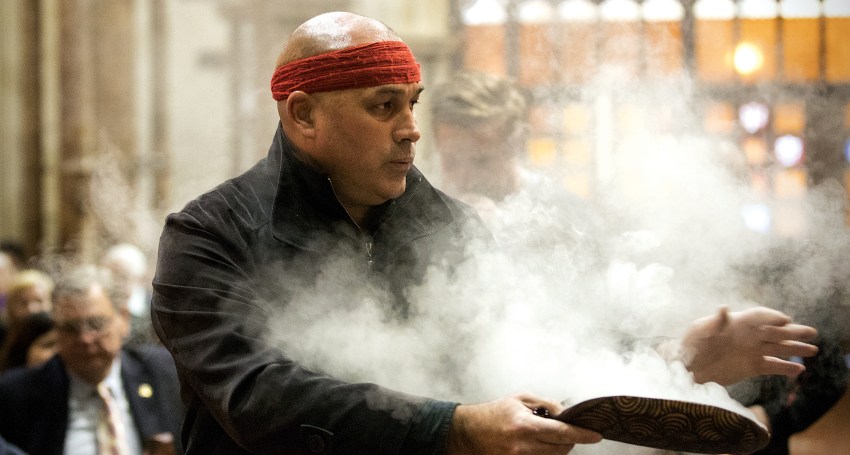Aboriginal Catholics leading the way
Local
With more than 130,000 Aboriginal and Torres Strait Islander Catholics in Australia, listening to the voice of the youngest and fastest growing group of people in the Church is vital, says respected South Australian elder and leader John Lochowiak.

Mr Lochowiak was recently re-elected for a second three-year term as chair of the National Aboriginal and Torres Strait Islander Catholic Commission.
He is also one of only 13 people appointed to the 2020 Plenary Council executive which is helping to shape consultation and the final agenda for the historic gathering to discuss the future of the Church in Australia.
Mr Lochowiak, who is manager of Aboriginal Services at Centacare Catholic Family Services, said the Plenary was an opportunity to show what Aboriginal Catholic ministry was doing well and to encourage the building of relationships through cultural awareness.
Advertisement
But he acknowledged that it was coming at a time when the Church was going through difficult times and the subject of much criticism, which was another reason to listen to Indigenous Catholics.
“Aboriginal people are very important to the Church now,” he said.
“We have been knocked, shoved and put down for a long time, we know what it’s like.
“Because we’ve been so decimated, we’ve hit out against each other; the Church has to be careful it doesn’t go the same way.”
He is confident the Church has much to offer Aboriginal people, in particular youth, and that’s why they are bucking the trend in terms of participation. (The number of Aboriginal Catholics has more than doubled over the past three decades.)
“We are spiritual people and we understand the connection of spirit, for example, when I go out with the elders, some of these fellas are traditional men and they’re reading the Bible,” he said.
“They love to read it because some of the stories are very similar to our traditional stories.
“When I was a kid going to RI (religious instruction), the priest would teach us about the Trinity and I was one of those kids who would say ‘how can three be one’.
“But when I was going through my initiation, the elders taught me the Aboriginal dreaming; they drew three circles in the red sand and called them the human world, the physical world and the sacred world, and I thought in my head ‘gee that’s the same as the Holy Trinity’.”
Mr Lochowiak said looking and understanding culture brings people closer together, “because we’ve got more in common than we have differences”.
“There will be differences but instead of being fearful of them, we celebrate them. I think that’s what makes Australia a unique country.
We’re made up of many different cultures and if we can take the best out of each one it’s going to build a greater society.
Advertisement
“I think Catholic schools are probably leading the way in that area, which makes me proud.”
Mr Lochowiak added that his involvement with several groups including the Plenary, NATSICC, Centacare and St Vincent de Paul, where he is the State vice president, meant he was able to “raise the profile” of the Aboriginal community, their needs and how to help them “deal with the issues they are facing”.
At a parish level, Mr Lochowiak said an important initiative had been development and roll out of Acknowledgment Plaques for churches and online training for parishes and communities.
“You don’t have to change the liturgy but just have the plaque in the church, and have acknowledgement or welcome to country at significant events,” he said.
“It doesn’t have to be every week but it actually acknowledges the traditional custodians from that area, it gives an opportunity for people to think, ‘hey we don’t know anything about them, let’s learn a little bit more’, and that breaks down barriers.”
Mr Lochowiak said being Catholic was important to many Aboriginals and he used his own Catholic background to explain why.
“My mum is a very strong Catholic,” he said. “Growing up she lived in three missions around South Australia, they weren’t treated too well because of government policies at the time, but when she said she was Catholic, other non-Aboriginal Catholics treated her well, being Catholic lifted her status.”
His father came to Australia from Poland as a 12-year-old and Mr Lochowiak remembers saying as child that Pope John Paul II was his uncle.
“Apart from both being Polish, they looked like each other,” he laughed.
“It was encouraged for Aboriginal women to marry a white man to breed out the Aboriginality, and the best people to mix with were the migrants because they weren’t seen to be too good either.
“My grandmother had 15 children so my mother’s got seven sisters and they all married white European men.”
His mother grew up on Point Pearce which wasn’t a Catholic mission, but the family used to walk all the way to Maitland to go to the Catholic church.
“My grandfather was one-eyed Catholic so he wasn’t going to go to a different church,” he said.








Comments
Show comments Hide comments